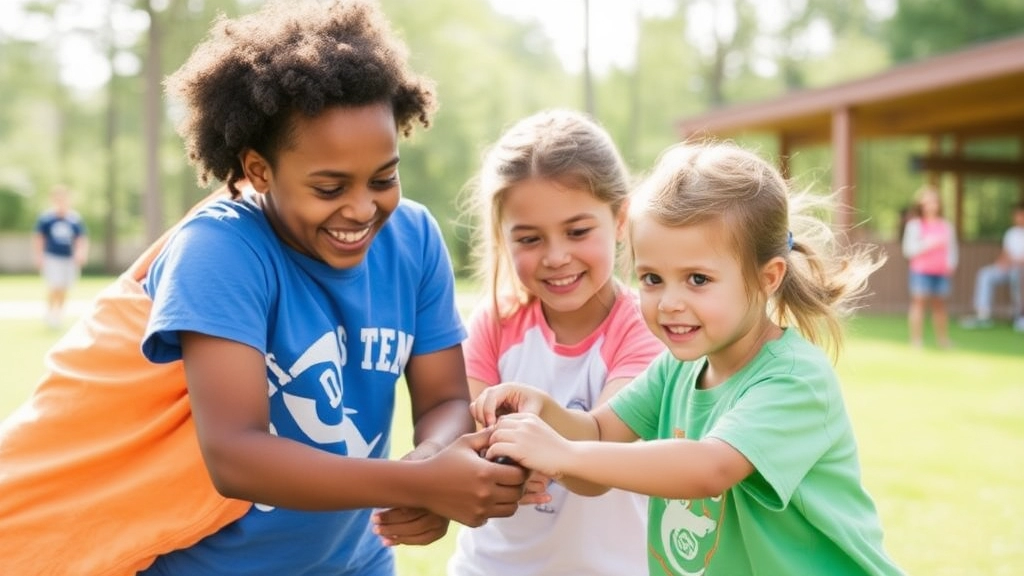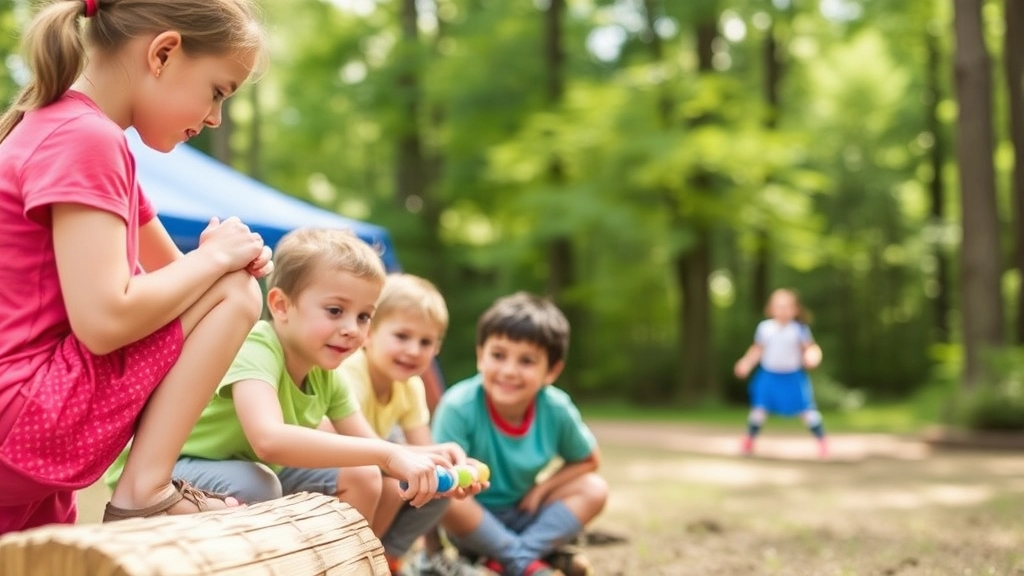Unforgettable Summer Experience
Are you ready to give your child an unforgettable summer experience? Look no further than the Boys and Girls Club summer camps! In this article, we’ll explore the diverse range of summer camp programs available, highlighting the numerous benefits of joining a Boys and Girls Club camp. From engaging activities to the importance of safety and staff qualifications, we’ve got you covered.
Exploring the Camp Programs
We’ll also delve into the specifics, such as age groups and eligibility requirements, the registration process and deadlines, and tips for preparing your child for camp. Plus, you’ll hear real testimonials from parents and campers that showcase the transformative impact of these camps. Ready to dive in? Let’s make this summer the best one yet for your child!
Overview of Summer Camp Programs
Are you wondering if a summer camp is right for your child? Maybe you’re worried about keeping them entertained while school’s out, or perhaps you’re looking for a way to help them make new friends and build some life skills. Well, you’re in the right place. Let’s break down what summer camp programs are all about and why they might be the perfect fit for your family.
What Are Summer Camp Programs?
Summer camp programs are structured activities designed to keep children engaged, active, and learning during the summer holidays. These camps can range from day camps, where kids go home each evening, to overnight camps, where they stay for a week or more. The keyword here is “engaged”âthese aren’t just babysitting services. Camps offer a wide range of activities that cater to various interests, from sports and arts to science and adventure.
Types of Summer Camps
- Day Camps: Ideal for younger children or those who prefer to sleep in their own beds. They typically run from morning till late afternoon.
- Overnight Camps: Perfect for older kids ready for a bit of independence. These camps often offer a more immersive experience.
- Specialty Camps: Focus on specific interests like robotics, dance, or basketball. If your child has a passion, there’s probably a camp for it.
- Adventure Camps: Think hiking, canoeing, and rock climbing. Great for kids who love the outdoors and a bit of thrill.
Why Consider a Summer Camp?
You’re probably thinking, “Why should I send my kid to camp?” Well, here are a few reasons:
- Structured Activities: Camps provide a structured environment where kids can learn and grow.
- Social Skills: Camps offer a great opportunity for children to make new friends and develop social skills.
- Independence: Especially in overnight camps, kids learn to be more independent and self-reliant.
- Physical Activity: Camps keep kids active, which is crucial for their health and well-being.
Real Concerns, Real Solutions
Let’s address some common concerns parents have:
- Safety: Camps take safety very seriously. From background checks on staff to secure facilities, your child’s well-being is a top priority.
- Homesickness: This is normal, especially for first-timers. Camps have strategies to help kids adjust and feel comfortable.
- Cost: Yes, camps can be pricey, but many offer scholarships or sliding scale fees based on income.
Quick Tips for Choosing a Camp
- Visit the Camp: If possible, visit the camp beforehand to get a feel for the environment.
- Talk to Other Parents: Get recommendations and reviews from parents whose kids have attended the camp.
- Check Credentials: Ensure the camp is accredited and the staff are qualified professionals.
For more detailed tips on selecting the right camp, check out our guide on camp registration forms to understand what to look for.
Benefits of Joining a Boys and Girls Club Camp

Why should you consider a Boys and Girls Club camp for your child this summer?
Great question.
Let’s dive in.
1. Safe Environment
First off, safety.
We all worry about our kids’ safety, right?
At a Boys and Girls Club camp, safety is a top priority.
They’ve got strict protocols in place, so you can rest easy knowing your child is in good hands.
2. Skill Development
Next up, skill development.
Kids aren’t just playing around; they’re learning.
From sports to arts and crafts, your child will pick up new skills that can boost their confidence and independence.
3. Social Interaction
Ever worry about your child making friends?
Boys and Girls Club camps are perfect for social interaction.
Kids from different backgrounds come together, creating a diverse and enriching environment.
Your child will learn teamwork, communication, and empathy.
4. Physical Activity
We all know how important physical activity is.
These camps offer a range of activities that keep kids moving.
From swimming to hiking, your child will get plenty of exercise, which is crucial for their health.
5. Affordable Options
Worried about the cost?
Boys and Girls Club camps are often more affordable than other options.
They offer scholarships and sliding scale fees, making it accessible for many families.
6. Experienced Staff
The staff at these camps are not just babysitters.
They’re trained professionals who know how to engage and inspire kids.
With their experience, they can handle any situation, giving you peace of mind.
7. Fun and Memories
Last but not least, fun.
Camps are all about creating lasting memories.
Your child will have stories to tell for years to come, and those memories are priceless.
Activities Offered at Summer Camps
Alright, let’s dive into the fun stuffâactivities offered at summer camps. If you’re wondering what your kids will actually do all day, you’re not alone. I’ve had the same questions myself. Here’s the lowdown on what to expect, and trust me, it’s more than just swimming and roasting marshmallows.
A Mix of Classic and Modern Fun
First off, summer camps have evolved. Sure, they still offer the classic stuff we all remember, but they’ve also got some new tricks up their sleeves. Here’s a breakdown:
- Outdoor Adventures: Think hiking, canoeing, and zip-lining. Camps are all about getting kids to enjoy nature.
- Sports Galore: From football to archery, there’s something for every budding athlete.
- Creative Arts: Painting, drama, and music sessions let the kids unleash their inner Picasso or Shakespeare.
- STEM Activities: Yep, camps are getting tech-savvy too. Robotics, coding, and science experiments are now part of the mix.
- Team Building Games: Capture the flag, scavenger hunts, and obstacle courses help kids learn to work together.
Specialised Camps
Some camps focus on specific interests. If your kid is into something particular, there’s probably a camp for that:
- Sports Camps: Specialise in one sport like basketball or tennis.
- Art Camps: Dive deep into painting, sculpture, or theatre.
- Science Camps: Perfect for the little Einsteins who love experiments.
- Adventure Camps: For the thrill-seekers who want to rock climb or white-water raft.
Daily Schedule
A typical day at camp might look something like this:
- Morning: Breakfast, followed by a group activity like a nature hike.
- Mid-Morning: Split into smaller groups for specialised activitiesâarts and crafts, sports, or science projects.
- Lunch: A break to refuel.
- Afternoon: More activities, often chosen by the kids themselves.
- Evening: Dinner, followed by a campfire or evening games.
Real Stories
Let me share a quick story. My buddy’s kid went to a summer camp last year and was absolutely terrified of heights. By the end of the camp, he was zip-lining like a pro. It’s amazing how these activities can help kids conquer their fears and build confidence.
Why It Matters
The variety of activities offered at summer camps isn’t just about keeping kids busy. It’s about:
- Building Skills: Sports teach teamwork, arts foster creativity, and STEM activities boost problem-solving skills.
- Making Friends: Kids bond over shared interests and activities.
- Boosting Confidence: Trying new things and succeeding gives kids a huge confidence boost.
For more detailed information on the types of activities available, check out our Top Summer Camp Games and Activities Guide. And if you’re interested in specialized camps, our Top Summer Camps for Teens article is a great resource.
Age Groups and Eligibility Requirements

Alright, let’s talk age groups and eligibility requirements.
Who can join the summer camp?
This is a question many parents have.
You want to know if your child fits the bill, right?
First, let’s break it down by age groups:
- Young Explorers (Ages 6-8): Perfect for those little ones who are just starting out. They get to dip their toes into a variety of activities.
- Junior Adventurers (Ages 9-11): This group gets a bit more adventurous. Think team sports, beginner-level crafts, and some basic outdoor skills.
- Teen Trailblazers (Ages 12-15): For the older kids who want a bit more independence. They get to tackle more challenging activities and even some leadership roles.
Eligibility Requirements
Now, what about eligibility?
Here’s the lowdown:
- Age Verification: Most camps will ask for a birth certificate or some form of ID to confirm your child’s age.
- Health Forms: Got to ensure your kiddo is fit for camp. So, expect to fill out some health and medical forms. Allergies? Medications? It’s all got to be documented.
- Behavioural Expectations: Camps usually have a code of conduct. It’s all about making sure everyone has a good time and stays safe. So, a quick chat with your child about respecting rules and being kind to others is a good idea.
Why Age Groups Matter
You might wonder, why split them up?
Simple.
Different ages, different needs.
You don’t want your 6-year-old competing with a 15-year-old in a football match, right?
Each age group gets activities tailored to their level of development.
Stories from the Camp
Last summer, we had a 7-year-old named Jake.
He was shy, didn’t want to leave his mum’s side.
By the end of camp, he was leading the Young Explorers in a scavenger hunt.
His mum couldn’t believe the transformation.
That’s the magic of age-appropriate activities.
Ready to Register?
If you’re thinking, “This sounds perfect for my child,” then you’re probably ready to dive into the registration process.
But hold on, we’ve got more info coming up on that.
Stay tuned for the next section on how to sign up and deadlines you shouldn’t miss.
In the meantime, if you have any questions, feel free to check out our FAQ section.
We’ve got answers to the most common queries right there.
So, there you have it.
Age groups and eligibility, all laid out.
Make sure your child fits the criteria, and they’ll be set for an unforgettable summer.
Registration Process and Deadlines
So, you’re thinking about signing your kid up for a Boys and Girls Club summer camp? Awesome decision! But I get it, the registration process can seem like a maze. Let’s break it down so it’s as clear as day.
How Do I Register My Child for Summer Camp?
First things first, head to the Boys and Girls Club website. Most clubs have an easy-to-navigate online portal where you can register. If you’re not a fan of the digital route, you can usually swing by the local club and handle it in person.
What Information Will I Need?
Before you dive into the registration, make sure you have the following details on hand:
- Basic Information: Your child’s full name, date of birth, and gender.
- Contact Information: Your name, phone number, and email address.
- Medical Information: Any allergies, medications, or special needs your child might have.
- Emergency Contacts: Names and phone numbers of people to contact in case you’re not available.
When Are the Deadlines?
Deadlines can sneak up on you, so mark your calendar. Typically, registration opens a few months before summer and closes a few weeks before camp starts. Here’s a quick rundown:
- Early Bird Registration: Opens in January and closes in March. You might snag a discount if you register early.
- Regular Registration: Runs from April to May.
- Late Registration: If spots are still available, you can usually register up until the week before camp starts, but don’t bank on it.
What About Fees?
Money talkâlet’s get it out of the way. Fees vary by location and the type of camp (day camp vs. overnight camp). Here’s a pro tip: many clubs offer scholarships or sliding scale fees based on your income. Don’t hesitate to ask about financial aid options.
Confirming Your Spot
Once you’ve submitted all the required information and paid the fees, you’ll get a confirmation email. Keep an eye out for this because it’s your golden ticket. If you don’t see it within a week, give the club a call to make sure everything’s in order.
Important Dates to Remember
- Orientation Day: Some clubs offer an orientation day for parents and campers. This is a great opportunity to meet the staff and get a feel for the camp.
- Payment Deadlines: Make sure all fees are paid by the specified deadlines to avoid losing your spot.
- First Day of Camp: Mark this on your calendar and start the countdown!
Real Talk: Stories from Parents
One mum I spoke to, Sarah, shared how she almost missed the deadline last year. “I thought I had more time, but suddenly it was the last week of registration! Thankfully, we got in, and it was the best decision ever. My son still talks about the friends he made and the activities he loved.”
For more information on how to pack for camp, check out our ultimate packing guide. And if you’re curious about the costs, our budget-friendly tips can help you plan better.
Safety Measures and Staff Qualifications

Alright, let’s talk about the big one: safety.
When it comes to sending your kids to summer camp, the first thing on your mind is probably, “How safe is it?”
I get it.
So, let’s break it down.
Safety Measures: What You Need to Know
Safety isn’t just a buzzword here. It’s a lifestyle.
We take it seriously. Here’s how:
- 24/7 Supervision: Kids are always under the watchful eyes of our trained staff.
- Emergency Protocols: We have plans in place for every possible scenario, from minor scrapes to major emergencies.
- First Aid: All staff are first-aid certified and we have medical kits readily available.
- Background Checks: Every staff member undergoes a thorough background check before being hired.
- Secure Premises: The campgrounds are secure, with limited access points and constant monitoring.
Staff Qualifications: Who Are These People?
Now, who’s looking after your kids?
Not just anyone.
Our staff are the real deal.
Here’s what we look for:
- Experience: We hire people who have been there, done that. They’ve worked with kids before and know the ropes.
- Training: Before camp starts, every staff member goes through rigorous training. We’re talking about everything from child psychology to conflict resolution.
- Passion: We want people who love working with kids. You can’t fake that kind of enthusiasm.
Real Stories: Why This Matters
I remember one parent, Sarah, who was super anxious about sending her 7-year-old to camp for the first time.
She called us almost every day for a week, asking about our safety measures.
By the end of the camp, her son didn’t want to leave, and Sarah? She was already signing him up for next year.
Ready to learn more? Check out our Activities Offered at Summer Camps or head over to the Registration Process and Deadlines to get started.
Got more questions? Dive into our Frequently Asked Questions About Summer Camps for all the details.
Testimonials from Parents and Campers
Real Questions and Worries
Ever wonder if sending your child to a summer camp is worth it? Will they fit in? Will they be safe? These are the questions that keep parents up at night. Let’s dive into some real stories from parents and campers who’ve been there, done that, and loved it.
Parents’ Perspective
Why Choose a Boys and Girls Club Camp?
I was sceptical at first. Would my child be safe? Would they enjoy it? But after the first week, my doubts vanished. The Boys and Girls Club Camp was a game-changer for our family.
What Parents Loved:
- Safety First: The camp’s safety measures are top-notch. From background-checked staff to secure facilities, I felt at ease knowing my child was in good hands.
- Skill Development: My child came back with new skills and stories every day. From arts to sports, they were constantly learning.
- Social Growth: Watching my child make new friends and grow socially was priceless.
Campers’ Perspective
What’s It Like at Camp?
As a camper, I was nervous. Would I make friends? Would I enjoy the activities? Here’s what I found out.
What Campers Loved:
- Endless Activities: From swimming to arts and crafts, there was never a dull moment.
- New Friendships: Meeting kids from different places was amazing. We shared laughs, stories, and even a few tears when camp ended.
- Confidence Boost: Trying new things and succeeding gave me a confidence I didn’t know I had.
Stories Over Coffee
Imagine sitting down with a friend and sharing these insights. That’s the vibe here. Real stories, real experiences, and real benefits.
A Parent’s Story:
“My son was shy and hesitant. After camp, he came back more outgoing and eager to try new things. It was like watching him blossom.”
A Camper’s Tale:
“I was scared of swimming. But with the help of the staff, I not only learned to swim but loved it! Now, I can’t wait for the next summer.”
Tips for Preparing Your Child for Camp

Worried about sending your child to summer camp for the first time? You’re not alone.
Every parent wants to ensure their kid has a blast while staying safe.
So, let’s dive into some practical tips to get your child ready for camp.
1. Talk About It Early
Start the conversation about camp weeks in advance.
Why?
It gives your child time to adjust to the idea and get excited.
2. Visit the Camp Together
If possible, take a trip to the campgrounds.
Seeing the place can ease a lot of anxiety.
It’s like a sneak peek into their summer adventure.
3. Pack Together
Don’t just throw everything into a bag last minute.
Make it a team effort.
- Create a packing list.
- Let your child pick out their clothes and essentials.
- Explain why each item is important.
4. Practice Independence
Simple tasks like tying shoes or packing a lunch can boost confidence.
Why is this important?
Camp is all about independence, and these small skills can make a big difference.
5. Role-Play Scenarios
What if they lose their way? Or feel homesick?
Act out these situations.
Give them strategies to handle different scenarios.
6. Discuss Camp Rules
Every camp has its own set of rules.
Go over them with your child.
- Explain why rules exist.
- Make sure they understand the importance of following them.
7. Pack Some Comfort Items
A favourite stuffed animal or a family photo can make your child feel more at home.
These small items can be a big comfort.
8. Encourage Social Skills
Camp is a social experience.
Help your child practice introducing themselves and making new friends.
9. Set Realistic Expectations
Talk about what camp will be like.
It’s not all fun and games.
There will be challenges, and that’s okay.
10. Stay Positive
Your attitude sets the tone.
If you’re excited and positive, your child will likely feel the same.
Bonus Tip: Keep the Communication Open
Let them know they can always talk to you about their feelings.
This builds trust and reassures them that you’re there for support.
By following these tips, you’re setting your child up for a successful and enjoyable camp experience.
Remember, the goal is to make camp a memorable adventure, not a stressful ordeal.
Ready to send your child off to camp?
These tips will help you feel more prepared and confident.
Got more questions?
Check out our FAQ section for more insights.
Frequently Asked Questions About Summer Camps
Got questions about summer camps? You’re not alone.
Let’s dive into the nitty-gritty and clear up those doubts.
What age groups can join summer camps?
Most camps cater to kids aged 6 to 17.
Some have specific age brackets for different activities.
Check the camp’s website for exact details.
How do I know if a camp is safe?
Safety is a big deal.
Look for camps with:
- Certified staff: First-aid, CPR, background checks.
- Low camper-to-staff ratios: More eyes on your kid.
- Clear safety protocols: Emergency plans, secure facilities.
What activities are usually offered?
Summer camps are packed with fun.
Think:
- Sports: Football, swimming, archery.
- Arts and crafts: Painting, pottery, DIY projects.
- Adventure: Hiking, canoeing, rock climbing.
How do I register my child?
Registration is usually straightforward:
- Visit the camp’s website.
- Fill out the application.
- Pay the fee.
- Submit any required documents.
Deadlines matterâget in early to avoid disappointment.
What should my child pack?
Keep it simple:
- Clothes: Comfortable, weather-appropriate.
- Toiletries: Toothbrush, soap, sunscreen.
- Gear: Sleeping bag, water bottle, flashlight.
For a detailed list, check out our summer camp packing list.
Label everythingâlost items are common.
How can I prepare my child for camp?
Ease those first-time jitters:
- Visit the camp beforehand: Familiarity helps.
- Talk about the schedule: What to expect each day.
- Pack together: Get them involved.
Are there any hidden costs?
Always ask:
- Extra activities: Some may cost more.
- Camp store: Money for snacks or souvenirs.
- Transport: Check if it’s included.
Can I contact my child during camp?
Policies vary:
- Phone calls: Some camps have scheduled call times.
- Emails: Quick and easy.
- Letters: Old-school but effective.
What if my child has special needs?
Many camps accommodate:
- Dietary restrictions: Gluten-free, vegetarian options.
- Medical needs: On-site nurses, medication management.
- Social support: Buddy systems, inclusive activities.
What do other parents and campers say?
Testimonials are gold.
Read reviews, ask friends, or check social media.
Real stories, real insights.
Frequently Asked Questions About Summer Camps
What are the benefits of joining a Boys and Girls Club camp?
Joining a Boys and Girls Club camp offers numerous benefits, including a safe environment, skill development, social interaction, physical activity, affordable options, experienced staff, and fun memories. These camps are designed to help children grow and develop in a supportive and engaging setting.
What age groups are eligible for the summer camp?
The camp is divided into three age groups:
- Young Explorers (Ages 6-8): Ideal for younger children who are new to camp activities.
- Junior Adventurers (Ages 9-11): Suitable for slightly older children who can handle more adventurous activities.
- Teen Trailblazers (Ages 12-15): Perfect for teens looking for more independence and challenging activities.
What are the eligibility requirements for the camp?
Eligibility requirements include age verification (usually a birth certificate or ID), health forms documenting any medical conditions or allergies, and adherence to the camp’s behavioral expectations.
What safety measures are in place at the camp?
Safety is a top priority at Boys and Girls Club camps. Measures include 24/7 supervision, emergency protocols, first aid-certified staff, thorough background checks, and secure premises with limited access points and constant monitoring.
How qualified are the staff at the camp?
The staff at these camps are experienced professionals who undergo rigorous training before the camp starts. They are passionate about working with kids and are well-versed in child psychology, conflict resolution, and other essential skills.
How can I prepare my child for camp?
Here are some tips to prepare your child for camp:
- Start talking about camp weeks in advance to build excitement.
- Visit the camp together if possible.
- Pack together and explain the importance of each item.
- Encourage independence by practicing simple tasks.
- Role-play different scenarios to prepare them for various situations.
- Discuss camp rules and their importance.
- Pack comfort items like a favorite stuffed animal or family photo.
- Encourage social skills and making new friends.
- Set realistic expectations about camp life.
- Maintain a positive attitude to set the tone.
What if my child feels homesick?
Homesickness is common, especially for first-time campers. Encourage your child to talk about their feelings and reassure them that it’s okay to miss home. Packing comfort items and maintaining open communication can also help ease homesickness.
Are there financial assistance options available?
Yes, Boys and Girls Club camps often offer scholarships and sliding scale fees to make the camp accessible for many families. It’s best to check with your local club for specific details on financial assistance.
How do I register my child for the camp?
Registration processes and deadlines vary by location. It’s advisable to visit the camp’s website or contact them directly for detailed information on how to sign up and the deadlines you need to meet.
For more detailed information, feel free to reach out to the camp’s administration or visit their FAQ section on the website.
References
-
Boys & Girls Clubs of America – Camps
-
American Camp Association – How to Prepare Your Child for Camp
-
Parents Magazine – How to Choose the Best Summer Camp for Your Child

